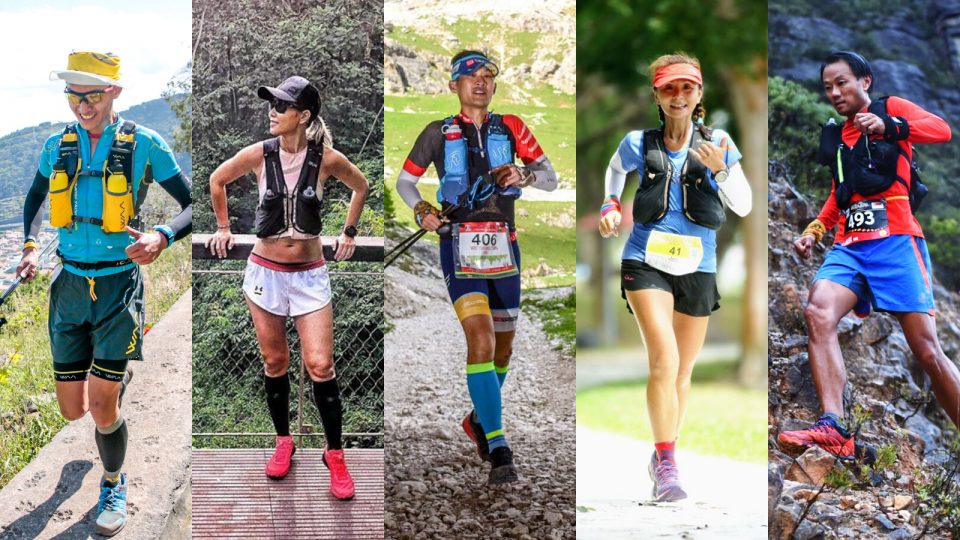Although Singapore has very limited locations for trail running, it does not prevent people from trying out the sport. The local trail running community is still vibrant with many awesome trail runners.
Most local trail runners have to stick with the common trail running locations in Singapore like Mandai, Bukit Timah Hill and MacRitchie which is why many trail runners have also explored overseas to find their next trail running adventure.
Previously, we have introduced 5 noteworthy trail runners of Singapore. Today, we continued to speak to 5 inspirational trail runners that are trying to spread positivity in Singapore trail running community.
1. Lua Jiong How
Bio: 24 year-old, Undergrad
As a free-spirited trail running enthusiast and geography student, Jiong How initially came to this sport after a short career in Floorball, which ended with injuries.
The injuries lead him to search for an alternative that could help him develop better fitness and mental resilience. Today he combines his passion for learning and the great outdoors to compete in mountain races around the world.
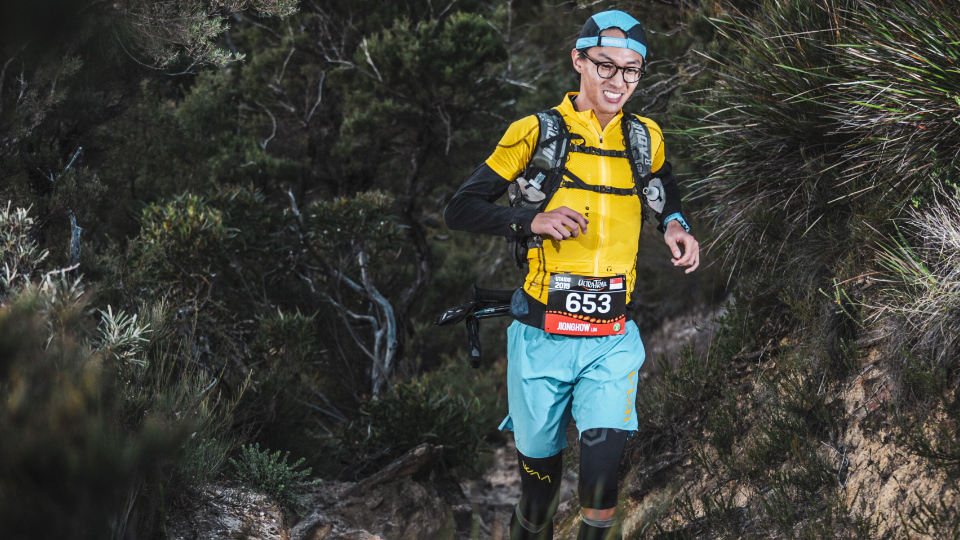
RS: Why did you start trail running?
Jiong How: Trail running is a holistic full-body exercise, which is also a relatively low impact compared to roads.
It is also less monotonous because I enjoy training and racing more, especially since race courses usually feature beautiful scenery.
Overall, I see plenty of longevity in this sport as long as it is practised safely.
RS: Where is your go-to place for trail training?
Jiong How: I hardly train on trails because I dislike commuting. Instead, I simulate the climbs and descents of mountain running in the hills we have in Singapore.
Back when I lived on (NUS) campus, most of my running was done in the Southern Ridges especially Kent Ridge Park. These days, I am training mostly in the Fort Canning hill because the pancake flat landscape in most parts of Singapore is simply not conducive for building mountain fitness.
My favourite places for train running include the highlands of Northern Thailand where I spent considerable time living and researching in, as well as the trails in the French Alps where I first competed in OCC.
RS: How do you train?
Jiong How: For two years I was coached by Jon Fong (Morph Performance) since my early career in desert racing. There is no one size fits all training plan because how you train always depends on what your body can handle.
But an important thing I realised over the years is to periodise the training load and change the stimulus frequently so that my fitness constantly improves in different dimensions.
I also force myself to run different types of races which include faster half marathons and shorter trail events that develop the necessary speed and competitive mindset when I tone down for off-season.
I am currently “uncoached” due to numerous life commitments that get in the way of my training, but I try my very best to develop consistency in training.
It is far more important to love the sport and commit to it in a sustainable way than to overdo training on a regular basis.
RS: What excites you the most throughout your trail running journey?
Jiong How: I like the element of uncertainty. There is always something new to expect along the way, sometimes good, sometimes not so much. There are times you do get a second wind, which encourages you to go harder and faster and achieve better times.
I also have a stomach issue which I am trying very hard to overcome, but it crops up sometimes that can really destroy your race. But as with life, there are ups and downs, it’s more important to press on and give what you got!
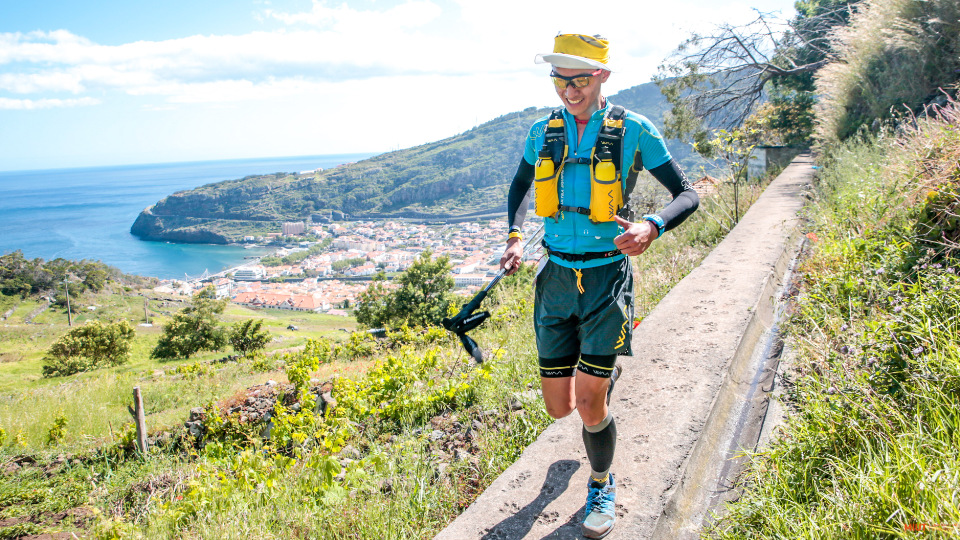
Trail running is a lifestyle, an opportunity for exploration, escape and learning.
RS: What makes you keep going back to trail running?
Jiong How: The scenery in trail running is usually incredible and that really keeps me going especially in longer races when the going gets tough. The races take you to places you might never have considered visiting, only to be surprised with what you will find.
My personal favourites are islands such as Gran Canaria and Fuerteventura where you get to play in a landscape so different from anywhere else.
People in the sport are usually wonderful and far less abrasive and competitive than in other sports. If there is any reason to stick with the sport, the people are the ones that will keep you going.
RS: What traits do you think are important to have in a good trail runner?
Jiong How: It’s important to have plenty of patience when you race and train because the races are long, likewise, the training constitutes a long-term lifestyle commitment.
Peak season training could be more than 10 hours a week and this is not something that yields immediate results. If you are in for the short term, this sport cannot offer that much because results and improvement take time.
Some other positive traits would be tenacity, grit and pain tolerance because racing can really draw you into the deepest suffering. Those who can suffer better will emerge a stronger and better race.
RS: Any advice for a newcomer who wanted to start trail running?
Jiong How: Take your time, enjoy the sport, don’t rush the progress and get caught up in being too competitive.
Racing is not always about the outcome, but the journey. Likewise, training is all about the process.
If you don’t enjoy it, it is hard to convince yourself to stick to the sport.
RS: What does trail running means to you?
Jiong How: It is a lifestyle, an opportunity for exploration, escape and learning.
It is a way to get back to touch with life’s simple pleasures, to give yourself personal time and space that is very hard to come by in this crazy breakneck pace of life.
You can follow Jiong How on Instagram: @unitedwefell
2. Marie Choo
Bio: 43 year-old, Dog Behaviourist and Trainer, Entrepreneur, Writer, Brand Ambassador
Once known for her work and style as a marketing and public relations professional, Marie Choo is known to many as The Dog Alchemist these days, after she gave up her career in the corporate world to become a dog behaviourist and trainer.
She has also transformed herself into an ultra-trail runner who runs distances of 100km and more to raise funds and awareness for animal shelters in Singapore through her charity outreach, I RUN FOR RESCUE DOGS.
As an avid phone cam photographer, she loves taking pics of nature when she is out hiking on trails and urban landscapes. When time permits, this multi-hyphenate also goes on adventure holidays to explore the mountains and caves.
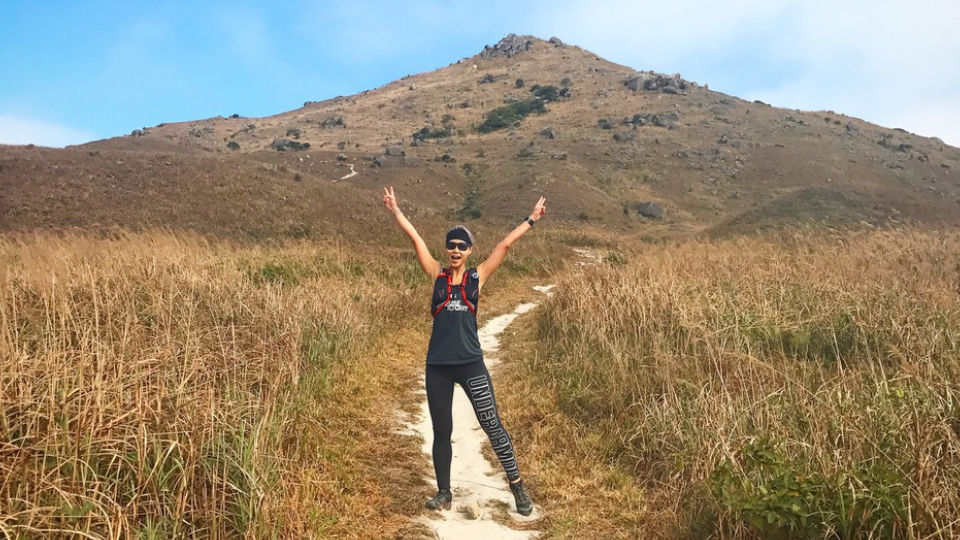
RS: How did you get love in trail running?
Marie: Like most runners, I started off with road running. From not being able to run 2km when I first started by completing my first full marathon in less than 10 months.
After completing 4 marathons in 2 years (3 being world majors – Tokyo, New York, Berlin, and one being Gold Coast), I needed to up my ante for my fundraiser I RUN FOR RESCUE DOGS. I was originally planning to run the London Marathon, but failed to win the ballot for a spot.
In a fit of anger, I decided to try trail running and challenged myself to my first ultra trail marathon of 50km at Translantau in Hong Kong. Since then, I have fallen in love with ultra trail running and decided to cross over to the ultra trail side.
I particularly like the longer distances of 100km and more. I am currently training for my 5th ultra race, which happens to be my first 100miler and it will be in Tarawera, Rotorua in New Zealand.
What I lack in speed, I make it up with endurance and a titanium mind. I always joke that I can’t outrun others, but I can try my best to outlast them.
I love what trail running has taught me when it comes to resilience, determination and prep strategy. It has also helped me overcome many fears that I used to have, such as the fear of getting dirty, insects, darkness and being alone in the forests.
RS: Where is your go-to place for trail training?
Marie: My all time favourite is Lantau Island in Hong Kong. I go there a few times a year for training. I love the simple life on the island, the friendly locals, as well as all the amenities and good food that is easily available too.
With regards to the terrains, I love the mountains with the stunning views, the terrains that are good for elevation training, and the fact that the trails are well marked and very safe.
RS: Do you have a secret training plan?
Marie: A good training plan consists of physical training, recovery, nutrition, gear prep, and mental toughness. My training plan is designed by my trail running coach and I follow what he has planned for me on a weekly basis.
Physical training is basically the running the sessions that form the majority of the training plan, and supported by cross training on days when I am not running.
For me, my running takes up 5 days of the week, and cross training will take up 2 days if not 1 day, depending on if I am being given a rest day for the week. Cross training for me could be cycling, stairs, swimming or any discipline of my choice that is not running.
Recovery for me is very important because I need to ensure my legs are fresh and I am ready to run the next day. I stretch at home daily to loosen up the tensed muscles.
I also go to YIN Yoga once or twice a week when time permits. I see my physiotherapist Aldrin Ho of Ziklag Fitness every two weeks for him to do dry needling to release my muscle tightness, as well as for him to correct any muscular imbalance from my high volume of training.
I also started doing Pilates with Daniel Chan of Pilates BodyTree to help with my posture and mobility.
Nutrition for me means eating well and using the right fuel during my runs. I am on a 95% whole food plant based diet and I find that my body thrives on it.
With this way of eating, I find that I am at my optimum race weight without having to watch what I eat or go on a diet. I have more energy and my recovery is good.
When I used to eat animal products, I will feel bloated and my legs will feel heavy and sluggish. I always believe that if I want to build my body’s engine to be like a Ferrari, I would need to give it good fuel and not cheap diesel.
That is my motivation to eat well and nutritiously. I do indulge in snacks from time to time in moderation because my training allows me to burn a lot of calories, but I am mindful to ensure I eat enough wholesome and nutritious food to aid in my running and recovery.
During my run, I will supplement with Pure Sports Electrolytes to ensure I have enough calories on my long runs, as well as to keep my mineral level in check.
This is to avoid hyponatremia and heat stroke. Since I am on an almost plant-based diet, I supplement with a vegan protein powder and the brand I use is Nuzest.
RS: What excites you the most throughout your trail running journey?
Marie: I always think an ultra trail race is akin to a Formula One race. Anything can go wrong may or will go wrong and you need to be well prepped for all situations. The race ain’t over till it is over, so every stage of the race is important.
As the distances are so long, starting fast doesn’t equate finishing fast. I enjoy about working on controlling the controls and come up with the best strategic plan to my best ability. I am always excited to see if my plan works well and if my execution is good in a race.
I get an immense sense of satisfaction when I cross the finish line of an ultra trail race. The research part of an ultra race is also very enjoyable that appeals to the geek side of me.
I like to study the terrain and plan how to tackle each stage of the race, and plan my nutrition and pace execution to achieve my desired results.
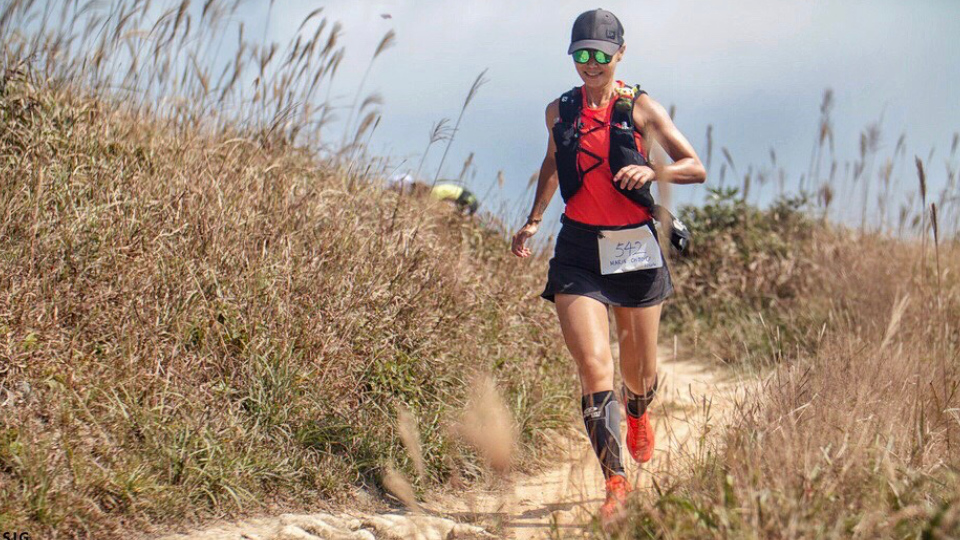
Trail running made me learn that limits are what we set for ourselves and pushes my own limits.
RS: What is the beauty of trail running?
Marie: Great scenery aside, the other aspect that actually makes me excited and addicted to ultra trail races is self discovery.
When the going gets tough and I am alone, I get to learn a lot about myself. I have to pep talk myself to get over the low periods and motivate myself to keep going even when my body is giving up.
With every race, I will have different experiences that allow me to learn and grow as a person. Ultra trail running makes me realise that I can achieve whatever I set my mind out to achieve.
It trains me to be disciplined and determined, and makes me resilient to always give my best and never give up. It has taught me to break things down and focus on the present.
For example, when I am doing a 100km trail race, I don’t think about how big the goal is and how long the distance may sound. I will break it down into 10x 10km for a start so it sounds more achievable.
When I get fatigued towards the end of the race, I will break it down further by 10x 1km and just focus on completing 1km at a time.
RS: What do you think are the most important traits to have in a good trail runner?
Marie: In my opinion:
- Determination – the will to achieve the goal. As I run to raise awareness and funds for the no-kill animal shelters in Singapore, I find that it helps with the determination part when one runs for the greater good other than for oneself.
- Mental toughness – things will get tough and even painful at times, but you must be tougher to keep going and not give up.
- Discipline – I have to train almost daily to slowly and steadily build endurance and muscle strength, and to avoid injuries.
- Positive attitude and mindset – learn to enjoy every part of the race and not just focus on the timing or outcome. With a positive attitude and mindset, setbacks are more bearable, you will be calmer to adapt accordingly when things go wrong, and you will be grateful for every step of the way in the race. That is why success will follow.
RS: Can you share some advice for the newcomer who just join trail running?
Marie: The advices are:
- Do not be afraid to ask experienced trail runners for advice. For a start, such as gear and routes.
- Read up on the topic online or specific books. Another great way is to listen to podcasts such Koopcast and Billy Yang. I learnt a lot by listening to podcasts about ultra trail running.
- Your gear is very important. As gear is expensive because of the technical nature, do your research and try the products before you buy. The fit and comfort of your gear are important because every little thing gets amplified over the long distance. The two most important gears for me are shoes and hydration packs. They are my lifelines at long runs and races. The grip of the shoes can truly add confidence to your strides. A hydration pack that doesn’t bounce, fits well and can pack the volume of your mandatory gear is important.
- Start by hiking and getting to know the terrain and let your feet get used to the uneven ground. After which you can slowly incorporate running. When starting out, don’t be gung-ho and run the speed that you do on the road, because the trails are very different. I apply the same concept when I am wearing a brand new pair of shoes. I will go slow and easy to test out the grip and proprioception before I will run the normal pace on trails.
RS: What does trail running means to you?
Marie: Trail running allows me to see the world in a different way on my own two feet. It also made me learn that limits are what we set for ourselves and I can keep pushing my own limits to see how far I can go.
You can follow Marie on Instagram: @mariechoo
3. Chin Wei Chong
Bio: 41 year-old, Senior Marketing Communications Manager
Beneath the compression gear of an ordinary Singaporean runner is a 41 year-old man juggling work, family, life and possess an immense passion for ultra-running.
Wei Chong works as a Senior Marketing Communications Manager at a Satellite Communications firm. Off work, he is a weekend warrior. He is fortunate enough to have a wife who understands his “crazy hobbies”. His hobbies have also made him the hero of his two little boys.
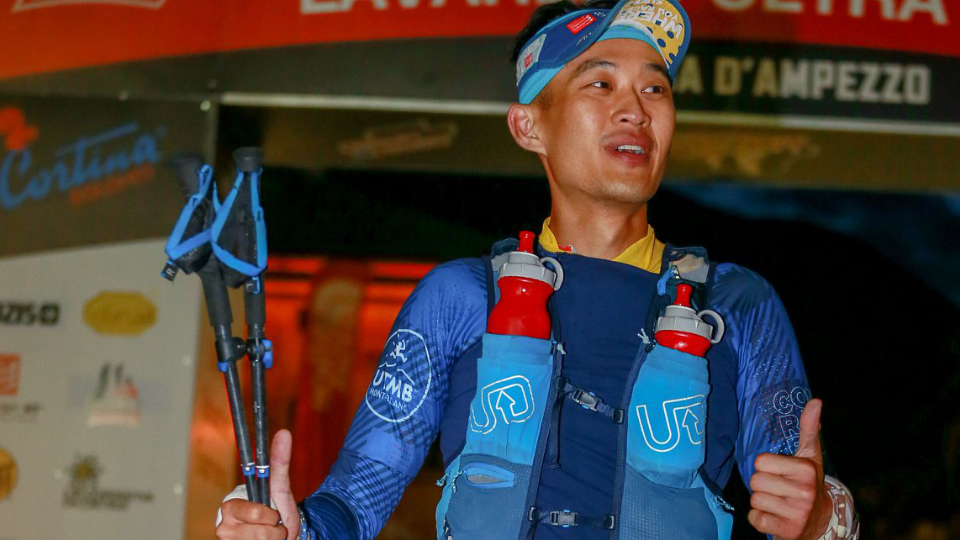
RS: How did you get started in trail running?
Wei Chong: I’ve enjoyed ultra trail running since 2014 and mountaineering since 2004.
Mountaineering Forays – My interest in both running and mountaineering started off in the early 2000s when I was in the Navy and started travelling to the region. I climbed Mount Kinabalu in 2004, scaled Mount Fansipan (highest peak in Vietnam) in 2007 and more recently reached the Uhuru Peak of Mount Kilimanjaro (5895m) in 2015.
Kilimanjaro is the highest mountain in Africa and one of the famed “seven summits” which feature the highest mountains in seven continents around the world.
I was privileged to be able to complete my Kilimanjaro with one of Singapore’s top adventurers Khoo Swee Chiow and was intrigued by the possibility of completing them all.
But timing, logistics and costs together with a young family and work commitments means I have to shelf these dreams for now.
Road Marathons and Ultra Running – Having participated in road marathons leisurely since 2002, I discovered ultra running in 2013 through trail races in Singapore and other local ultra runners.
With my interest in both mountaineering and running, it was easy to fall in love with this sport. I was privileged to have the opportunity to have since raced in some of the most beautiful trails in the world.
In 2014, I participated in the Marathon des Sables. It was a 250km semi self-supported stage race in the Sahara desert also known as the “toughest footrace on Earth”.
RS: Where do you go for trail training?
Wei Chong: Beyond the usual playgrounds such as MacRitchie and Bukit Timah Nature Reserve, I also love training at Mount Faber at night. I like that the area is quiet and easily accessible from my home.
There is also a myriad of different stairs that offers pretty decent vert gains while ensuring runners won’t get bored.
One moment you are in a peaceful area en-route from Marang Trail to the Henderson Waves and the next moment you could be in the middle of crowds at the Seah Im food centre for a short break.
RS: What’s your training plan?
Wei Chong: As I juggle my role as a husband, father and a regional marketer, it is important for my training plans to fall within a packed schedule.
The key is consistency as I try to run at least 5 times a week. Leading up to a race I could hit 14 hours and 7 times a week, modest numbers as compared to some of the monster trail runners in Singapore!
A typical weekday would be 30-45 minute runs from work to home. I would usually incorporate one longer road workout on the Wednesday.
If it’s a hill workout, I would head to Fort Canning. On weekends closer to races, I would be at either Bukit Timah or Mount Faber, clocking my LSDs.
RS: What excites you the most throughout your trail running journey?
Wei Chong: For me, trail running is a journey of solitude. Training by myself, running for hours on end totally immerse in nature rejuvenates me from the daily grind.
Yet on the other hand, I’m also thrilled to have gotten to know a great bunch of fun-loving folks in the ultra-running community. You seldom see egos getting in the way in Ultra-trail running.
What you will see are waves and friendly smiles in races and training runs at the trails. Most of all, running is such a pain and joy at the same time.
It keeps me on my toes and I felt it gave me the mental strength to run through some of the ups and downs in my career and life.
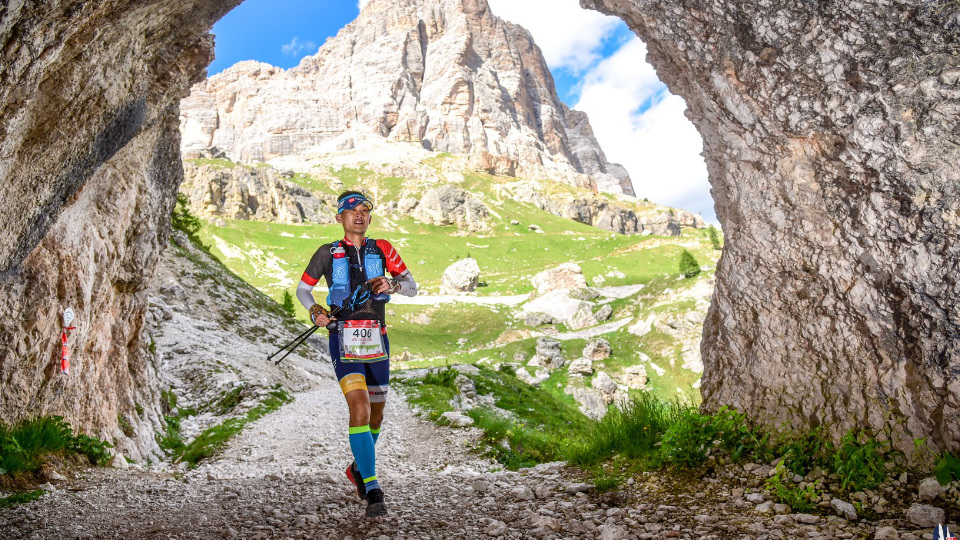
Trail running gave me the opportunity to meet many wonderful friends and accomplish goals I’ve never dreamt of doing.
RS: What attracts you back to trail running?
Wei Chong: Many of us trail runners are lucky to have the opportunity to run in beautiful, hard to reach places. I’ve ran in tough hot conditions in the Sahara Desert and chilly mountainous terrains in the European and Asia regions.
Trail runs offers running enthusiasts the opportunity to explore incredibly scenic places in detail, and it is not possible to mimic that experience from a tour bus. I’m just glad to be able fulfil my passions in one go at ultra races – travel, run and in the mountains.
RS: What are the traits to have in a good trail runner?
Wei Chong: Almost all the runners I’ve met have that extra mental toughness edge in them. We just don’t give up!
RS: How would you say to a newcomer in trail running?
Wei Chong: Preparation, preparation, preparation. Get acquainted with the heat across the region, train accordingly and know how your body will react to the conditions.
When going to overseas races, always do your research, mentally map out the races through information/videos online and plan your nutrition and gear. Most importantly, always keep a positive frame of mind, regardless of the odds.
RS: What does trail running means to you?
Wei Chong: Trail running is such a joy. It gave me the opportunity to meet many wonderful friends and accomplish goals I’ve never dreamt of doing previously. My goals are to keep running, keep competing, and hopefully I will not be too far behind my boys on the trails when they are all grown-up!
You can follow Wei Chong on Instagram: @weichongchin
4. Lynn Woo
Bio: 45 year-old, Finance Related
It has been 10 years since Lynn has been into running. She started as a cross country runner in Junior College. However, work and family took over her life after she graduated from Uni. She only picked up running again in 2009.
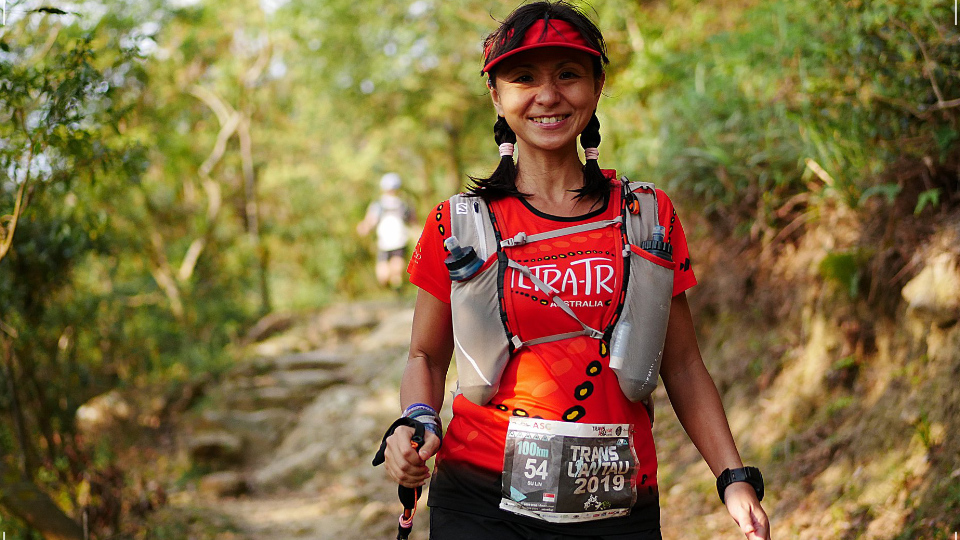
RS: What did you choose trail running?
Lynn: I think it’s a natural transition from regular road running to trail running. I dare to say it was trail running that helped me to manage and subsequently addressed my knee discomfort I had from pounding too much on the hard tarmac.
The mixed terrain on the trails provide good condition with relatively lesser stress on the joints. I started running in 2009, did a full marathon in 2010, and decided to try out trail running with much influence from my running friends then.
RS: Where do you go for your trail training?
Lynn: There isn’t much of an option in Singapore, my love is MacRitchie. It’s pretty much shaded and safe toilets to top up water along the way.
RS: How do you train for your trail marathon?
Lynn: I don’t really have a training plan. However, I do make it a point to incorporate running as a way of life. The way I function is, I must burn what I eat.
So, I did not run for a couple of days, I will feel totally uncomfortable and sick. Trail running is a luxury for me only on weekends. I make it a point to clock my mileage either in hours, or in elevation in MacRitchie or Bukit Timah Nature Reserve.
RS: What excites you the most throughout your trail running journey?
Lynn: The places that I go to my trail races! I get to breathe a different kind of air, and see different awesome scenery, learn about improving myself and getting away from the urban life.
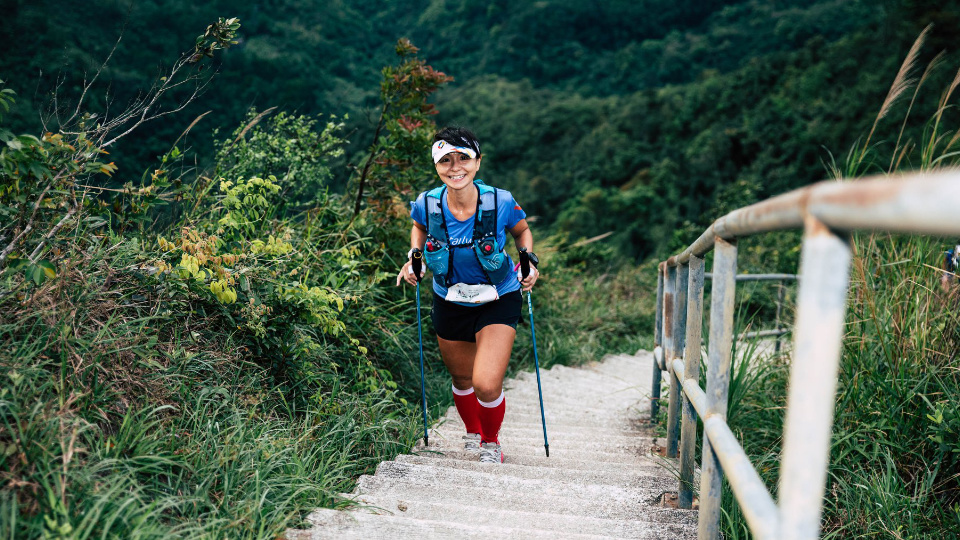
Trail running is my way of destress, and I feel thankful for the body I have to let me run.
RS: What makes you keep going for trail running?
Lynn: When I run on the trails, all I hear is my own breathing and the sound of nature and my footsteps. I need to tune in the run, focus on every step, and that takes the focus away from the hectic urban life.
It gives me an outlet to destress and decompress and almost everything feels better after a good run.
RS: How to become a trail runner?
Lynn: Anyone can be a trail runner! You can even walk if you like, basically you just need to enjoy the great outdoors, love to be in the element, and you can enjoy the space out there! You do not need to be fast, but you need to love what you do.
RS: What’s your advice for new trail runners?
Lynn: The only difference between road and trail running is that your shoes and feet get really dirty after your run so I guess one must be ready for that? Basically just run. There are no rules, no ideal pace, just enjoy the moment where it’s just you and your breath.
RS: What does trail running means to you?
Lynn: Trail running is my life. It’s my me time, and if I have a few hours to spare, my priority is always to get my run in. It’s my way of destress, and feeling thankful for the body I have to let me run.
You can follow Lynn on Instagram: @lynnwoosh
5. Alex Ang
Bio: 47 year-old, Investment Consultant
Alex is a specialist in enterprise sales, and strategic negotiations in technology and investment consulting services. A great advocate of environment indulgence, he feels alive in the presence of nature. When he is not closing deals and providing high quality financial modelling solutions, he is out there hitting the roads and trails.
Alex has always been active in his younger days, and he was involved in many activities like soccer, rugby, athletics, volleyball, gymnastics, Tae Kwon Do, Wakeboarding, golf and so on.
However, he had a late start and embarked on his running journey only in my 40s. After a major knee operation in 2013, he came to appreciate running a whole lot more and vowed not take mobility for granted.
Now, he runs simply because he can, always remembering those days when he was wheelchair bound. He run for those who cannot and let them see the beauty of the trails all over the world through his eyes.
He also runs to raise funds for rescue dogs (strays and abandoned dogs), so they have a proper shelter over their heads and a better life.
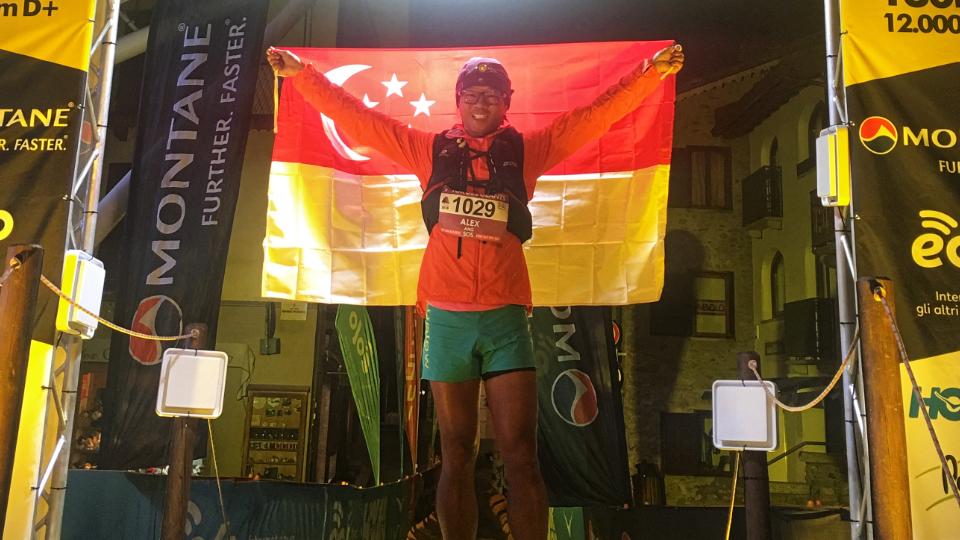
RS: Why did you choose trail running?
Alex: I think runners, especially ultra-trail runners are masochists and suffer from amnesia. We tend to forget the pain and hurt easily after an event and continue to subject ourselves to more.
After my knee surgery, I run simply because I can, always remembering those days when I was wheelchair bound, especially those who cannot and what they would give for this simple gift. I run for those who can’t and let them see the beauty of the trails through my eyes. I found freedom in running and enjoy being out there with nature.
Since then, I have gone on to experience trails around the world. Below is a snapshot of my adventures over the past 2 years:
- Feb 2018. 9Dragons 50/50 (Hong Kong). 50 miles, 5070D+; 50km, 3730D+.
- Mar 2018. Translantau (Hong Kong). 103km, 5800D+.
- Apr 2018. Green Race (Hong Kong). 75km, 4,500D+.
- Apr 2018. UTMF (Tokyo, Japan). 170km, 8,000D+.
- Jul 2018. Force of Nature (Singapore). 64km. 1st team category.
- Sep 2018. Tor Des Geants (Courmayeur, Italy). 330km, 29,000D+.
- Feb 2019. Fast 100 (Hong Kong). 50 miles, 2500 D+
- Mar 2019. Translantau (Hong Kong). 100km 5800D+.
- Mar 2019. MSIG Ultra @ Tai Po (Hong Kong). 75km, 4180 D+ & 44km, 2640D+. 2nd overall Men. 1st in age group.
- June 2019. The Moon Ultra (Koh, Phangan, Thailand). 103km, 5200D+.
- June 2019. Tailwind Penang Eco ({Penang, Malaysia). 104km, 4200D+. 3rd Men.
- Aug 2019. UTMB (Chamonix, France). 170km, 10,000D+
RS: Where do you go for your trail training?
Alex: Unfortunately, we have very few natural resources when it comes to trail running. I typically head to MacRitchie Reservoir, Dairy Farm Nature Park, Chestnut Nature Park and Windsor Nature Park for trails running. Over to Bukit Timah Nature Reserve, Mount Faber, Southern Ridges, and Fort Canning for some elevation training.
Living in the east provides me proximity to one of Singapore’s most treasured urban getaways with a scenic coastline over 15 km to run!
RS: How do you train for your trail races?
Alex: Unlike many of my peers, I do not have a structured training program. My training revolves around my work and family commitments. I do also travel for work frequently, which makes it more challenging to have training cycles.
I adhere to a ‘do what I can, when I can’ training mantra. Run commute when I can and have the bulk of my training centred during the weekends, largely back to backs. I build up race experiences through a series of lead up races to the main event and make training trips to Hong Kong for more specific training.
Due to my work schedule, business trips, and family commitments; I neither have a fixed mileage nor elevation target each week. I fit in my training whenever I can and make full use of the time I have to optimise my sessions.
I also use supplemental forms of exercise to improve my level of fitness. This includes cycling, roller blading, and free form body weight exercises to build stronger muscles to carry the backpack, maintain good running form, and to power up those mountains I am to face.
RS: What excites you the most throughout your trail running journey?
Alex: Just being able to be out there in nature and amongst the mountains makes me happy. The feeling of freedom in the majestic mountains, the adventure of the unknown and the awesome trail runners I have met along the way are the beauty of my trail running journey.
Trail running has also helped me understand my body intimately and how much pain and suffering I can tolerate. The distance and the toughness of some trail running adventures I have embarked upon often strips me bare and they teach me humility and tolerance.
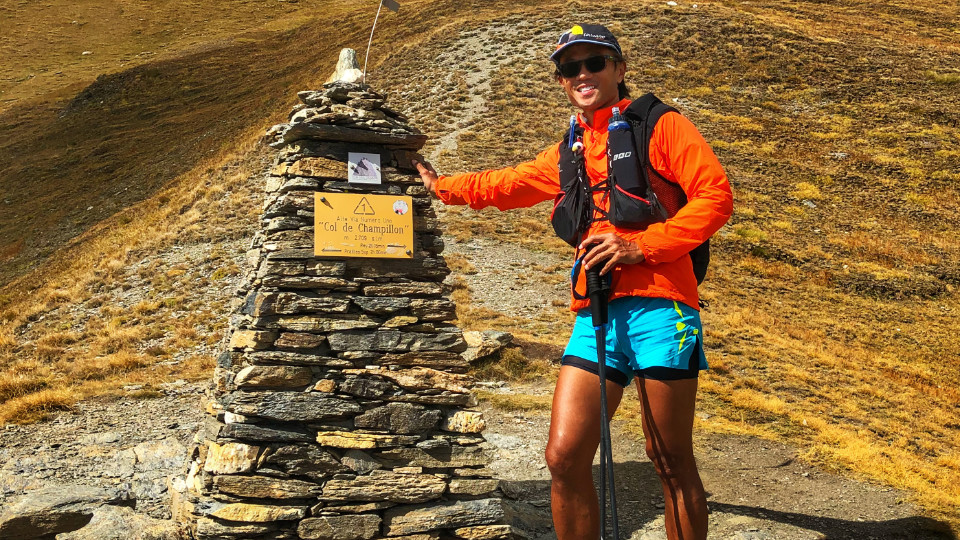
I run for those who can’t and let them see the beauty of the trails through my eyes.
RS: Why do you like trail running so much?
Alex: The elevation and there are always a lot more cool stuff to see at the top of a mountain! It’s not that trails necessarily have to be vertical; it’s just that they often are. Even if you start out running on flat river trails and levee paths, odds are eventually you’ll want to run up (and then down).
It takes me to new places; I can reach places I could not get to by car. Mountain tops, volcanoes, rivers, valleys, gorges, lakes and so on. The beauty and serenity of nature tops the list for sure!
RS: How to become a good trail runner?
Alex: Trail runners are people who like adventure, variety, challenge, and excitement. The essence of trail running is the ability to deal with constant change.
No two steps are the same on the natural obstacle course of off-road terrain. Trail runners have emotional engagement. They care about the trails, the races and the community surrounding the event.
RS: How should newcomers approach trail running?
Alex: 3 Ps. Patience, Pacing and Persistence.
- Patience is a virtue – Don’t rush into getting high mileage within a short period of time under the belt during trainings or unsustainable fast pace from the start of an ultra. Both are definite regrettable mistakes.
- Pacing. Understand your body – everyone is different. Pace well as this is one of the most important aspects of an ultra.
- Persistence. Running an ultra is all about ‘shit’ management – when you are out there for a prolonged period of time, things will go wrong such as weather, GI issues, fatigue, injuries, abrasions, blisters and the list just goes on and on. How to manage them and persist through it all is key to finishing.
RS: What does trail running means to you?
Alex: Few men during their lifetime come anywhere near exhausting the resources dwelling within them. There are deep wells of strength that are never used. Finding the depth of my well, and digging further to new depths are cornerstones of my trail running journey.
You can follow Alex on Instagram: @a_c0uchp0tat0
The True Spirit of Trail Running
Nothing develops all the faculties of an immature mind more than a trail running away into the unknown.
There are many benefits of trail running and one can only reap the benefits if they have the courage and willingness to explore running on the trails.
All the trail runners that we spoke to certainly did. So what are you waiting for? We awaits you to share your next trail running experience with us!



